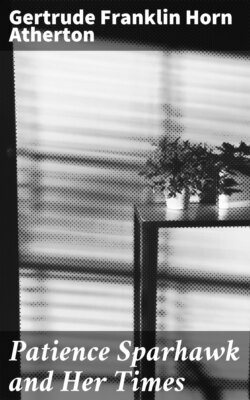Читать книгу Patience Sparhawk and Her Times - Gertrude Franklin Horn Atherton - Страница 22
На сайте Литреса книга снята с продажи.
XVII
ОглавлениеTable of Contents
One day, late in September, Patience, as usual, left Monterey at half past four in order to reach home in time to cook the supper. Nature had smiled for so many successive days that she wondered if the lips so persistently set must not soon strain back and reveal the teeth. The sun, poised behind the pine woods, flooded them with yellow light. As Patience walked through the soft radiance she set her teeth and recalled the chapters of Thiers’ “French Revolution,” through which she had that day plodded. But her head felt dull. She realised with a quiver of terror that she was beginning to feel less like an intellect and more like a very helpless little girl. Once she discovered her curved arm creeping to her eyes. She flung it down and shook her head angrily. Was she like other people?
Mingling with the fragrance of the pines it seemed to her that she smelt smoke. She hoped that her woods were not on fire. She walked slowly, indisposed as ever to return home, the more so to-day as she felt herself breaking.
“I wish the sun would not grin so,” she thought. “I’ll be glad when winter comes.”
The smell of smoke grew stronger. She left the woods. A moment later she stood, white and trembling, looking down upon Carmel Valley. The Sparhawk farmhouse was a blazing mass of timbers. A volume of smoke, as straight and full as a waterspout, stood directly above it. Men were running about. Their shouts came faintly to her.
Patience pressed her hands convulsively to her eyes. She clutched her head as if to tear out the terrible hope clattering in her brain, then ran down the hill and across the valley, feeling all the while as if possessed by ten thousand devils.
“Oh, I’m bad, bad, bad!” she sobbed in terror. “I don’t, I don’t!”
As she reached the scene the roof fell in. She glanced hastily about. The men, withdrawn to a safe distance, were gathered round the man Oscar. One was binding his hands and face. As they saw Patience they turned as if to run, then stood doggedly.
“Where is she?” Patience asked.
There was an instant’s pause. The crackling of the flames grew louder, as if it would answer. Then one of the men blurted out: “Burnt up in her bed. She was drunk. We was all in the field when the fire broke out. When we got here Oscar tried to get at her room with a ladder, but it was no go. Poor old Madge.”
Patience without another word turned and ran back to the woods. She ran until she was exhausted, more horrified at herself than she had been at any of her unhappy experiences. After a time she fell among the dry pine needles, her good, as she expressed it, still trying to fight down her bad. She felt that the demon possessing her would have sung aloud had she not held it by the throat. She conjured up all the horrible details of her mother’s death and ordered her soul to pity; but her brain remarked coldly that her mother had probably felt nothing. She imagined the charred corpse, but it only offended her artistic sense.
Finally she fell asleep. The day was far gone when she awoke. She lay for a time staring at the dim arches above her, listening to the night voices she had once loved so passionately. At last she drew a deep sigh.
“I might just as well face the truth,” she said aloud. “I’m glad, and that’s the end of it. It’s wicked and I’m sorry; but what is, is, and I can’t help it. We’re not all made alike.”
